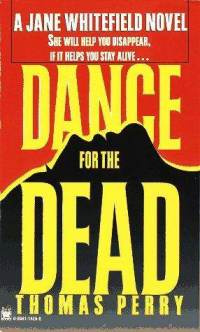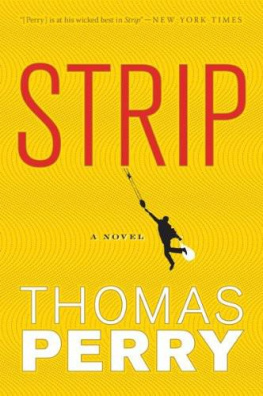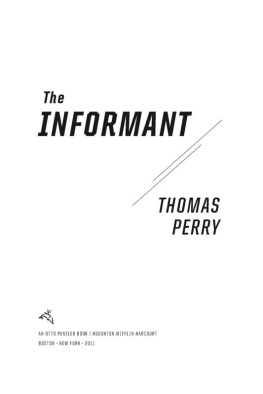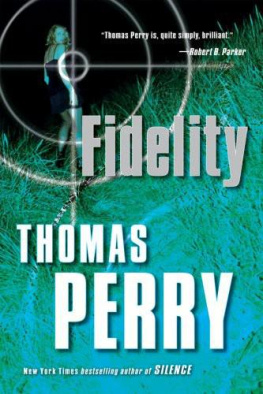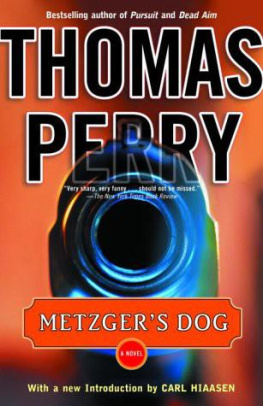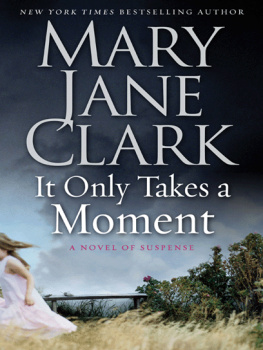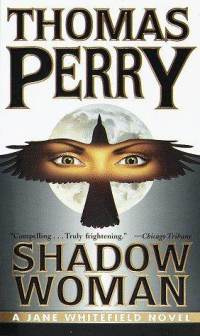DANCEFOR THE DEAD
ThomasPerry
Copyright 1996 by Thomas Perry
For Jo
withlove to Alix and Isabel
The common aim of all war parties wasto bring back persons to replace the mourned-for dead. This could bedone in three ways: by bringing back the scalp of a dead enemy (thisscalp might even be put through an adoption ceremony); by bringingback a live prisoner (to be adopted, tortured, and killed); or bybringing back a live prisoner to be allowed to live and even toreplace in a social role the one whose death had called for thisrevenge.
AnthonyF. C. Wallace, The Death and Rebirth of the Seneca, 1969
1
Thetall, slim woman hastily tied her long, dark hair into a knot behindher head, planted her feet in the center of the long courthousecorridor, and waited. A few litigants and their attorneys passed her,some of them secretly studying her, more because she was attractivethan because she was standing motionless, forcing them to step aroundher on their way to the courtrooms. Her chest rose and fell in deepbreaths as though she had been running, and her eyes looked pastthem, having already dismissed them before they approached as shestared into the middle distance.
She heard the chime sound abovethe elevator thirty feet away. Before the doors had fully parted,three large men in sportcoats slipped out between them and spun theirheads to stare up the hallway. All three seemed to see her within aninstant, their eyes widening, then narrowing to focus, and thenbecoming watchful and predatory, losing any hint of introspection asthey began to move toward her, one beside each wall and one in themiddle, increasing their pace with each step.
Several bystanders averted theireyes and sidestepped to avoid them, but the woman never moved. Shehiked up the skirt of her navy blue business suit so it was out ofher way, took two more deep breaths, then swung her shoulder bag hardat the first mans face.
The mans eyes shone withtriumph and eagerness as he snatched the purse out of the air. Thetriumph turned to shock as the woman slipped the strap around hisforearm and used the momentum of his charge to haul him into thesecond man, sending them both against the wall to her right. As theycaromed off it, she delivered a kick to one and a chop to the otherto put them on the floor. This bought her a few heartbeats to devoteto the third man, who was moving along the left wall to get behindher.
She leaned back and swung oneleg high. The man read her intention, stopped, and held up his handsto clutch her ankle, but her back foot left the ground and she hurledher weight into him. As her foot caught him at thigh level andpropelled him into the wall, there was the sickening crack of hisknee popping. He crumpled to the floor and began to gasp and clutchat his crippled leg as the woman rolled to the side and sprang up.
The first two men were rising totheir feet. Her fist jabbed out at the nearest one and she rocked himback, pivoted to throw an elbow into the bridge of his nose, andbrought a knee into the second mans face.
There was a loud slapping soundand the womans head jerked nearly to her left shoulder as abig fist swung into her cheekbone. Strong arms snaked around her frombehind, lifted her off her feet to stretch her erect, and she saw therest as motion and flashes. The first two men rushed at her in rage,aiming hard roundhouse punches at her head and face, gleeful in thecertainty that she saw the blows coming but could do nothing to blockthem or even turn to divert their force.
Two loud, deep voicesoverlapped, barking for dominance. Police officers! Freeze!
Step away from her!When her opponents released her and stepped away, she dropped to herknees and covered her face with her hands. In a moment, severalbystanders who had stood paralyzed with alarm seemed to awaken. Theywere drawn closer by some impulse to be of use, but they only hoveredhelplessly nearby without touching her or speaking.
The judges chambers werein shadow except for a few horizontal slices of late-afternoonsunlight that shone through the blinds on the wood-paneled wall.Judge Kramer sat in his old oak swivel chair with his robe unzippedbut with the yoke still resting on his shoulders. He loosened his tieand leaned back, making the chairs springs creak, then pressedthe play button on the tape recorder.
There were sounds of chairsscraping, papers shuffling, and a garble of murmured conversation, sothat the judges empty chamber seemed to be crowded withinvisible people. A female voice came from somewhere too close to themicrophone. This deposition is to be taken before Julia R.Kinnock, court stenographer at 501 North Spring Street, Los Angeles,California, at ten seventeen a.m. on November third. Thecourts instructions were that if there is an objection to theuse of a tape recorder, it will be turned off. There wassilence. Will the others in the room please identifythemselves.
David M. Schoenfeld,court-appointed counsel to Timothy Phillips. Schoenfeldsvoice was smooth, and each syllable took too long to come out. JudgeKramer could almost see him leaning into the microphone to croon.
Nina Coffey, Departmentof Childrens Services, Los Angeles County, in the capacity ofguardian for a minor person. Kramer had read her name on anumber of official papers, but he had never heard her voice before.It was clear and unapologetic, the words quick and clipped, as thoughshe were trying to guard against some kind of vulnerability.
Kyle Ambrose, AssistantDistrict Attorney, Los Angeles. As usual, the prosecutorsounded vaguely confused, a pose that had irritated Kramer throughsix or seven long trials.
Then came the low, monotonevoices that were at once self-effacing and weighty, voices of men whohad spent a lot of time talking over radios. They started quietly andgrew louder, because the last part of each name was the importantpart.
Lieutenant James E.Bates, Los Angeles Police Department.
Agent Joseph Gould,Federal Bureau of Investigation.
There was some more shuffling ofpapers and then Julia Kinnock said, Mr. Ambrose, do you wishto begin?
Ambroses parched,uncertain voice came in a beat late. Will you state your namefor the record, please?
There was some throat clearing,and then the high, reedy voice of a young boy. TimTimothy John Phillips.
Schoenfelds courtroomvoice intoned, Perhaps it would be a good idea to ask that therecord show that Lieutenant Bates and Agent Gould here present haveverified that the deponents fingerprints match those ofTimothy John Phillips, taken prior to his disappearance.
The two voices muttered, Soverified, in the tone of a response in a church. Amen, thoughtKramer. Schoenfeld had managed to sidestep onto the record with theone essential fact to be established in the case from Schoenfeldspoint of view.
Ambroses voice becameslow and clear as he spoke to the boy. You are to answer ofyour own accord. You are not to feel that you are in any wayobligated to tell us things you dont want to. JudgeKramer could imagine Ambroses dark eyes flicking to the facesof Schoenfeld, the lawyer, and Nina Coffey, the social worker. It wasa confidence game, as Ambroses legal work always was. The kidwould have to answer all of the questions at some point, but Ambrosewas trying to put the watchdogs to sleep. Mr. Schoenfeld ishere as your lawyer, so if you have any doubts, just ask him. AndMrs. Coffey will take you home if youre too tired. Do youunderstand?
The small, high-pitched voicesaid, Yes.
How old are you?
Eight.
Can you tell me, please,your earliest recollections? Judge Kramer clenched his teeth.
You mean, ever?
Yes.
I remember Iguess I remember a lot of things. Christmas. Birthdays. I remembermoving into our house in Washington.
When was that?

